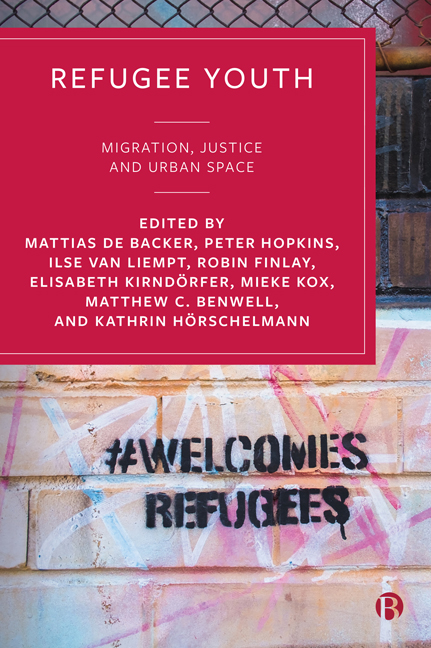Book contents
- Frontmatter
- Contents
- List of Figures and Tables
- Notes on Contributors
- Acknowledgements
- 1 Introducing Refugee Youth: Migration, Justice and Urban Space
- 2 Storying Belonging, Enacting Citizenship? (Dis)articulations of Belonging in a Community Theatre Project with Young Refugees and Asylum Seekers in Leipzig, Germany
- 3 Jackets and Jewellery: Racialised Dispossession and Struggles over Public Space in Denmark
- 4 Venezuelan Refugee Youth and Brazilian Schooling: The Individual between Languages and Spaces
- 5 The Inclusionary Potential and Spatial Boundaries of (Semi-)Public Space: Refugee Youth’s Everyday Experiences in the Urban Fabric of Amsterdam
- 6 Navigating ‘Purdah’ Culture in Urban Space: The Restricted Lives of Young Married Rohingya Refugees in Malaysia
- 7 Inclusive Urban Planning and Public Space for Refugee Youth in Pursuit of a Just City in Amman, Jordan
- 8 Sense of Belonging among Tibetan Refugees in India: A Case Study of the Bylakuppe Settlement in Karnataka, India
- 9 Negotiating Identity in Urban Space: Everyday Geographies of Syrian Students in Istanbul
- 10 ‘You’re Judged a Lot’: Australian Sudanese and South Sudanese Youths’ Perspectives on Their Experiences in Public Spaces
- 11 Hair Salons as ‘Private-Public Spaces’: Exploring the Experiences of Young Migrant Women in an Urban Township in South Africa
- 12 Emotion and Spatial Belonging: Exploring Young Migrant Men’s Emotional Geographies in Cork, Ireland
- 13 Homemaking through Music in Urban Africa: Creating Opportunities as a Refugee and a Migrant in Kinshasa and Dar es Salaam
- 14 Planetary Listening
- 15 Refugee Youth: Politics, Publicness and Visibility
- Index
15 - Refugee Youth: Politics, Publicness and Visibility
Published online by Cambridge University Press: 18 January 2024
- Frontmatter
- Contents
- List of Figures and Tables
- Notes on Contributors
- Acknowledgements
- 1 Introducing Refugee Youth: Migration, Justice and Urban Space
- 2 Storying Belonging, Enacting Citizenship? (Dis)articulations of Belonging in a Community Theatre Project with Young Refugees and Asylum Seekers in Leipzig, Germany
- 3 Jackets and Jewellery: Racialised Dispossession and Struggles over Public Space in Denmark
- 4 Venezuelan Refugee Youth and Brazilian Schooling: The Individual between Languages and Spaces
- 5 The Inclusionary Potential and Spatial Boundaries of (Semi-)Public Space: Refugee Youth’s Everyday Experiences in the Urban Fabric of Amsterdam
- 6 Navigating ‘Purdah’ Culture in Urban Space: The Restricted Lives of Young Married Rohingya Refugees in Malaysia
- 7 Inclusive Urban Planning and Public Space for Refugee Youth in Pursuit of a Just City in Amman, Jordan
- 8 Sense of Belonging among Tibetan Refugees in India: A Case Study of the Bylakuppe Settlement in Karnataka, India
- 9 Negotiating Identity in Urban Space: Everyday Geographies of Syrian Students in Istanbul
- 10 ‘You’re Judged a Lot’: Australian Sudanese and South Sudanese Youths’ Perspectives on Their Experiences in Public Spaces
- 11 Hair Salons as ‘Private-Public Spaces’: Exploring the Experiences of Young Migrant Women in an Urban Township in South Africa
- 12 Emotion and Spatial Belonging: Exploring Young Migrant Men’s Emotional Geographies in Cork, Ireland
- 13 Homemaking through Music in Urban Africa: Creating Opportunities as a Refugee and a Migrant in Kinshasa and Dar es Salaam
- 14 Planetary Listening
- 15 Refugee Youth: Politics, Publicness and Visibility
- Index
Summary
All the contributions to this collection draw on qualitative research with refugee youth, and many use participatory research and creative methods to trace the personal geographies, politics and emotions associated with migration, justice and urban spaces. Interesting theoretical discussions have emerged across the chapters, especially around the notions of politics, publicness and visibility, and we expand on these in this conclusion.
Politics
Asylum seekers and refugees often arrive in a hostile political context with very clear demarcation lines around who belongs and who does not belong. In this collection, among others, in Chapter 8 by Anne Grent and Ajay Bailey, and in Chapter 3 by Malene Jacobsen, the politics of belonging is prominently present. The former leans conceptually on Antonsich (2010), who identifies the politics of belonging as a discursive resource that constructs, claims, justifies or resists forms of socio-spatial inclusion or exclusion (p 1). The latter describes how migrant boys are framed as a security risk in public space and engage in counter-politics, by reclaiming spaces, identities and ways of being, via artistic performances characterised by a self-conscious politics of refusal, which reconfigures the relationship of domination and subordination altogether.
This also resonates with the Lefebvrian call for the right to the city echoed in several chapters (Lefebvre, 1996; Mitchell, 2003). In Chapter 7, Rana Aytug connects this with the notion of inclusive city planning. The right to the city signifies the right for all city inhabitants ‘to appear on all the networks and circuits of communication, information and exchange’ (Lefebvre, 1996, pp 194– 195). The urban environment is a fertile ground for emerging forms of civic engagement in response to challenges like an imbalance of power among urban stakeholders. Examining justice in the city through the lens of inclusive planning, Aytug argues, has the potential to generate new possibilities and raise a greater sense of political consciousness.
This politics- and rights-based analysis surfaces also in Chapter 4 by Camila da Silva Lucena and Fabiele Stockmans De Nardi, which emphasises mothers’ access to education, basic services and cultural expression, and in Chapter 6 by Mohd Al Adib Samuri and Peter Hopkins, which details the ways in which female Rohingya refugees in Malaysia are denied access to education, where community-based schools lack the resources, transportation, teaching equipment and basic facilities necessary to teach refugee children.
- Type
- Chapter
- Information
- Refugee YouthMigration, Justice and Urban Space, pp. 231 - 237Publisher: Bristol University PressPrint publication year: 2023



